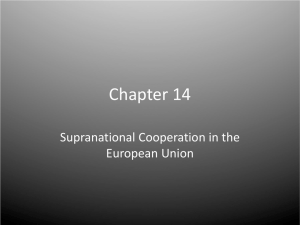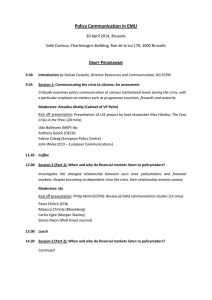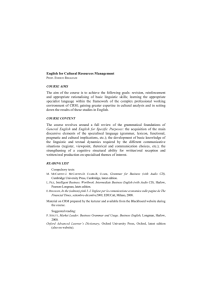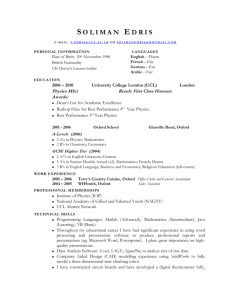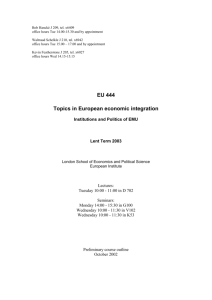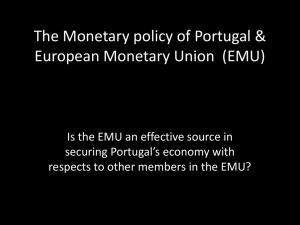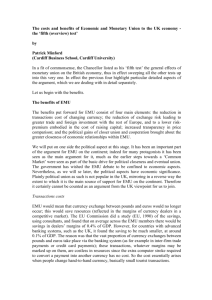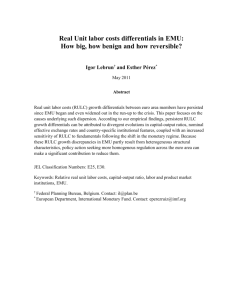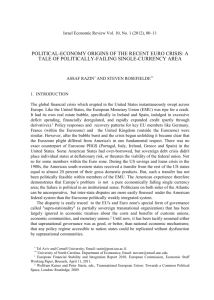Syllabus
advertisement
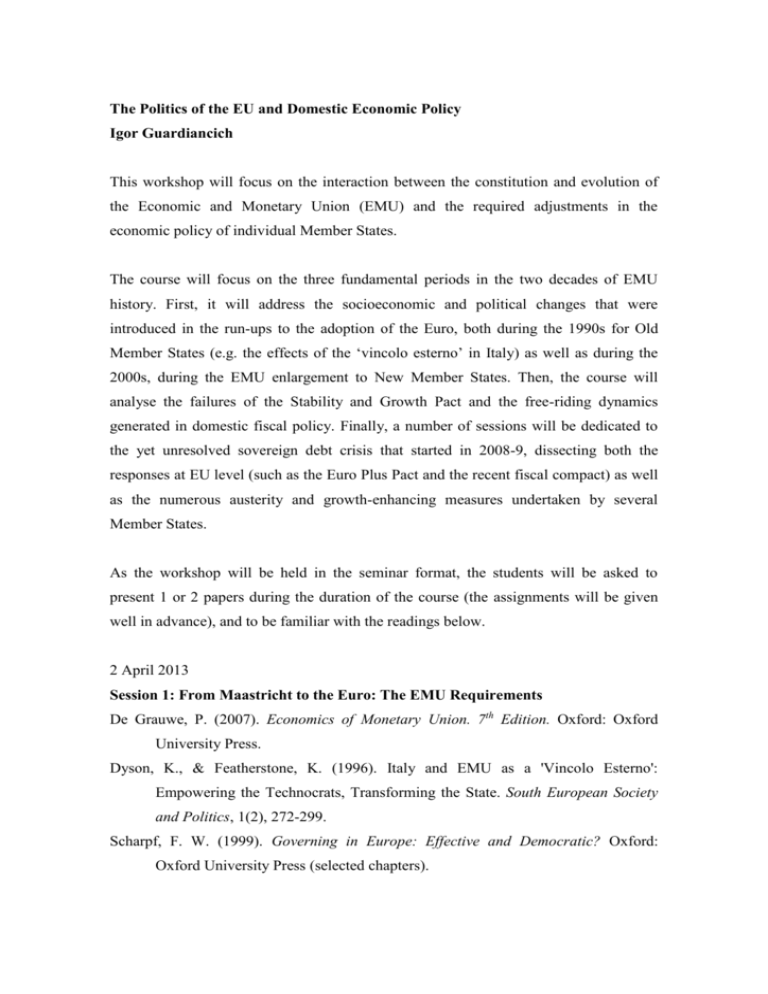
The Politics of the EU and Domestic Economic Policy Igor Guardiancich This workshop will focus on the interaction between the constitution and evolution of the Economic and Monetary Union (EMU) and the required adjustments in the economic policy of individual Member States. The course will focus on the three fundamental periods in the two decades of EMU history. First, it will address the socioeconomic and political changes that were introduced in the run-ups to the adoption of the Euro, both during the 1990s for Old Member States (e.g. the effects of the ‘vincolo esterno’ in Italy) as well as during the 2000s, during the EMU enlargement to New Member States. Then, the course will analyse the failures of the Stability and Growth Pact and the free-riding dynamics generated in domestic fiscal policy. Finally, a number of sessions will be dedicated to the yet unresolved sovereign debt crisis that started in 2008-9, dissecting both the responses at EU level (such as the Euro Plus Pact and the recent fiscal compact) as well as the numerous austerity and growth-enhancing measures undertaken by several Member States. As the workshop will be held in the seminar format, the students will be asked to present 1 or 2 papers during the duration of the course (the assignments will be given well in advance), and to be familiar with the readings below. 2 April 2013 Session 1: From Maastricht to the Euro: The EMU Requirements De Grauwe, P. (2007). Economics of Monetary Union. 7th Edition. Oxford: Oxford University Press. Dyson, K., & Featherstone, K. (1996). Italy and EMU as a 'Vincolo Esterno': Empowering the Technocrats, Transforming the State. South European Society and Politics, 1(2), 272-299. Scharpf, F. W. (1999). Governing in Europe: Effective and Democratic? Oxford: Oxford University Press (selected chapters). Ferrera, M., & Gualmini, E. (2004). Rescued by Europe?: Social and Labour Market Reforms in Italy from Maastricht to Berlusconi. Amsterdam: Amsterdam University Press (selected chapters). McKay, D. (2005). Economic Logic or Political logic? Economic Theory, Federal Theory and EMU. Journal of European Public Policy, 12(3), 528-544. 3 April 2013 Session 2: Enlarging the EU: The New Member States and the EMU Dyson, K. (2006). Enlarging the Euro Area: External Empowerment and Domestic Transformation in East Central Europe. Oxford: Oxford University Press (selected chapters). Dyson, K. (2007). Euro Area Entry in East-Central Europe: Paradoxical Europeanisation and Clustered Convergence. West European Politics, 30(3), 417-442. Epstein, R. A., & Johnson, J. (2010). Uneven Integration: Economic and Monetary Union in Central and Eastern Europe. Journal of Common Market Studies, 48(5), 1237-1260. 4 April 2013 Session 3: The Global Financial Crisis 2008-9 Carmassi, J., Gros, D., & Micossi, S. (2009). The Global Financial Crisis: Causes and Cures. JCMS: Journal of Common Market Studies, 47(5), 977-996. Jones, E. (2009). The Euro and the Financial Crisis. Survival, 51(2), 41-54. Monastiriotis, V., & Zartaloudis, S. (2010). Beyond the Crisis: EMU and Labour Market Reform Pressures in Good and Bad Times. LEQS Paper, 23. Schelkle, W. (2011). A Tale of Two Crises: The Euro Area in 2008/09 and in 2010. European Political Science, 10(3), 375-383. 5 April 2013 Session 4: The Sovereign Debt Crisis 2010-? Featherstone, K. (2011). The JCMS Annual Lecture: The Greek Sovereign Debt Crisis and EMU: A Failing State in a Skewed Regime. JCMS: Journal of Common Market Studies, 49(2), 193-217. Jones, E. (2012). The JCMS Annual Review Lecture: European Crisis, European Solidarity. JCMS: Journal of Common Market Studies, 50(s2), 53-67. Pisani-Ferry, J. (2012). The Euro Crisis and the New Impossible Trinity. Bruegel Policy Contribution, 1. Scharpf, F. (2011). Monetary Union, Fiscal Crisis and the Preemption of Democracy. LEQS Paper, 36. Schelkle, W. (2012). Good Governance in Crisis or a Good Crisis for Governance? A Comparison of the EU and the US. Review of International Political Economy, 19(1), 34-58. Presentations and suggested readings The 8 topics are divided into 4 groups (two for each session): 1) The emergence of social pacts in EU's periphery as a precondition for EMU entry. Rhodes, M. (2001). The political economy of social pacts: Competitive corporatism and European welfare reform. In P. Pierson (ed.): The new politics of the welfare state (Oxford: Oxford University press). Natali, D., &Pochet, P. (2010). Introduction: The last wave of social pacts in Europe: problems, actors and institutions. In P. Pochet, M. Keune & D. Natali (eds): After the Euro and Enlargement: Social Pacts in the EU (Brussels, ETUI and OSE). 2) The (in)Stability and Growth Pact: rationale, enforceability and consequences. De Grauwe, P. (2012). Economics of Monetary Union. 9th Edition. Oxford: Oxford University Press. McKay, D. (2005). Economic Logic or Political logic? Economic Theory, Federal Theory and EMU. Journal of European Public Policy, 12(3), 528-544. 3) The political and economic implications of the enlargement of the EMU. 4) Discuss the trade-off between European conditionality and the developmental goals of the New Member States. Epstein, R. A., & Johnson, J. (2010). Uneven Integration: Economic and Monetary Union in Central and Eastern Europe. Journal of Common Market Studies, 48(5), 12371260. Grabbe, H. (1999). A partnership for accession?: the implications of EU conditionality for the Central and East European applicants (No. 12). European University Institute, Robert Schuman Centre. 5) Failures of the European Central Bank in dealing with the crisis: an economic and political analysis. De Grauwe, P. (2012). Economics of Monetary Union. 9th Edition. Oxford: Oxford University Press. Pisani-Ferry, J. (2012). The Euro Crisis and the New Impossible Trinity. Bruegel Policy Contribution, 1. 6) The interaction between banking and sovereign crises in Old and New Member States. De Grauwe, P. (2012). Economics of Monetary Union. 9th Edition. Oxford: Oxford University Press. Diemo D., Knedlik, T., & Lindner, A. (2011). Central and Eastern European Countries in the Global Financial Crisis: A Typical Twin Crisis? Post-Communist Economies 23 (4): 415-432. 7) The instruments devised by the EU to prevent future sovereign debt crises and their implications for democratic accountability. Fabbrini, S. (2013) Intergovernmentalism and its limits: The implications of the Euro crisis on the European Union. Commission and ECB websites. 8) Main reforms imposed by the EU during the crisis and domestic political repercussions. Please pick one or more countries (Spain, Ireland, Greece) and explain what the troika does, and what the political implications were. Commission, IMF and ECB websites.



